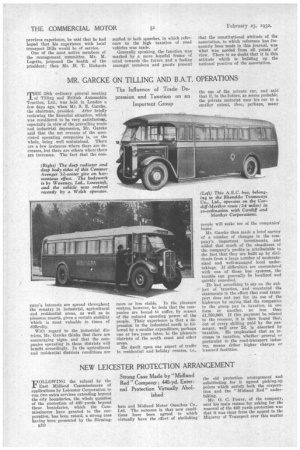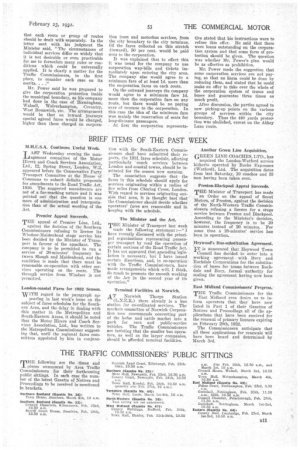NEW LEICESTER PROTECTION ARRANGEMENT
Page 44

Page 45

If you've noticed an error in this article please click here to report it so we can fix it.
Strong Case Made by "Midland Red Company ; 440-yd. External Protection Virtually Abolished FOLLOWING the refusal by the ..12 East Midland Commissioners of applications by Leicester Corporation to run two extra services extending beyond the city boundaries, the whole question of the protection of 440 yards beyond these boundaries, which the Commissioners have granted to the corporation, has been raised, a strong case having been presented by the Birming. B10
ham and Midland Motor Omnibus Co., Ltd. The outcome is that new conditions have been agreed to which virtually have the effect of abolishing the old protection arrangement and substituting for it agreed picking-up points which satisfy both the corpora tion and the "Midland Red" undertaking. Mr. 0. C. Power, of the company, said his main reason for asking for the removal of the 440 yards protection was that it was clear from the appeal to the Ministry of Transport over this matter that each route or group of routes should be dealt with separately. In the letter sent with his judgment the Minister said, "The circumstances of individual services differ so widely that it is not desirable or even practicable for me to formulate many rules or conditions which could be universally .applied. It is clearly a matter for the Traffic Commissioners, in the first place, to consider each case on its merits. . . ."
Mr. Power said he was prepared to give the corporation protection inside the municipal boundary, as his company had done in the case of Birmingham, Walsall, Wolverhampton, Coventry, West Bromwich, etc. The arrangement would be that on inward journeys special agreed fares would be charged, higher than those charged on corpora
tion tram and motorbus services, from the city boundary to the city terminus. Of the fares collected on this stretch (inward), 50 per cent, would be paid over to the corporation.
It was explained that to effect this it was usual for the company to use corporation way-bills and tickets immediately upon entering the city area. The company also would agree to a minimum fare of at least 1,d. more than the corporation fares on each route.
On the outward journeys the company would agree to a minimum fare ld. more than the corporation fare on any route, but there would be no paying over of revenue to the corporation. In this case the idea of the minimum .fare was mainly the reservation of seats for long-distance passengers. • . At first the corporation representa tive stated that his instructions were to refuse this offer. He said that there were loans outstanding on the corporation system and that some form of protection should be given. The question was whether Mr. Power's plan would be as effective as prohibition.
Mr. Power made the suggestion that some corporation services are not paying, so that no harm could be done by reducing them, and stated that he could make an offer to take over the whole of the corporation system of trams and buses and guarantee three times as much profit.
After discussion, the parties agreed to new picking-up points on the various groups of services within the city boundary. Thus the 440 yards proteo, tion was abolished, except on the Abbey Lane route.




































































































